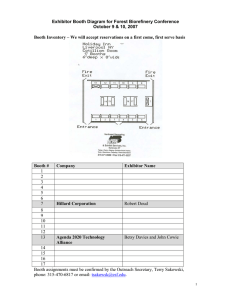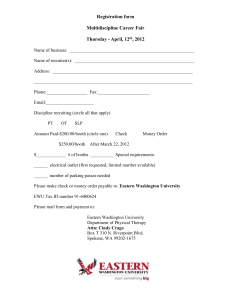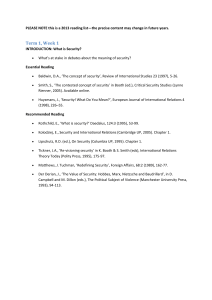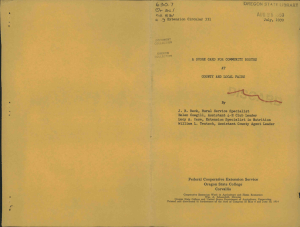OBSERVATION POLICIES FOR THE KENT STATE UNIVERSITY CHILD DEVELOPMENT CENTER
advertisement
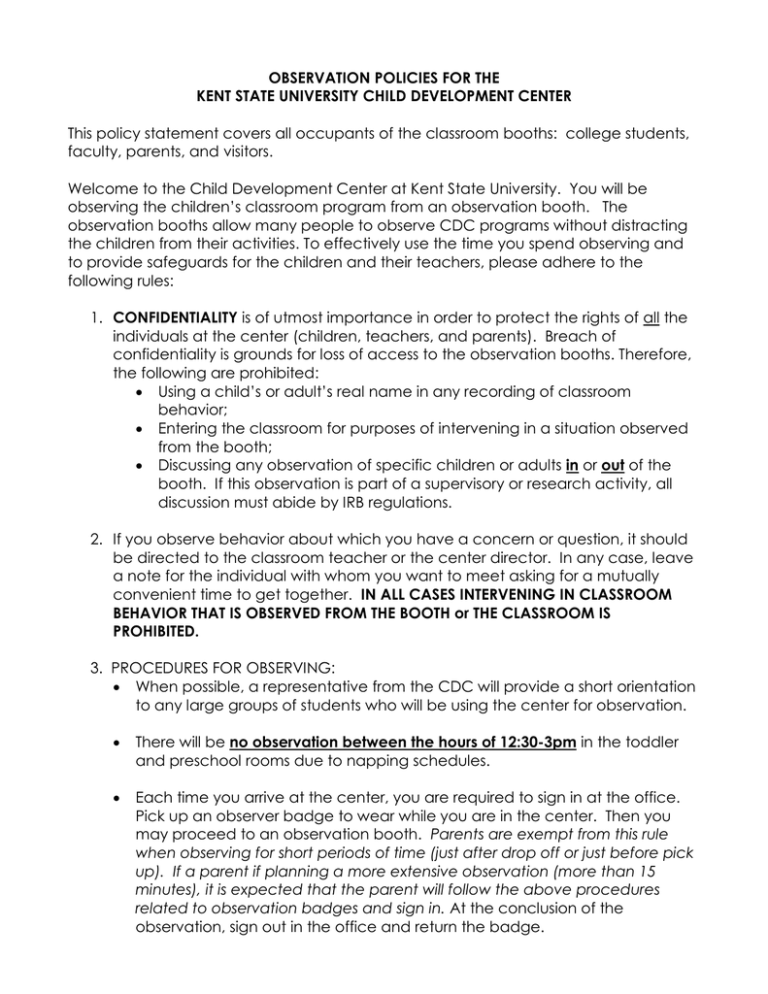
OBSERVATION POLICIES FOR THE KENT STATE UNIVERSITY CHILD DEVELOPMENT CENTER This policy statement covers all occupants of the classroom booths: college students, faculty, parents, and visitors. Welcome to the Child Development Center at Kent State University. You will be observing the children’s classroom program from an observation booth. The observation booths allow many people to observe CDC programs without distracting the children from their activities. To effectively use the time you spend observing and to provide safeguards for the children and their teachers, please adhere to the following rules: 1. CONFIDENTIALITY is of utmost importance in order to protect the rights of all the individuals at the center (children, teachers, and parents). Breach of confidentiality is grounds for loss of access to the observation booths. Therefore, the following are prohibited: Using a child’s or adult’s real name in any recording of classroom behavior; Entering the classroom for purposes of intervening in a situation observed from the booth; Discussing any observation of specific children or adults in or out of the booth. If this observation is part of a supervisory or research activity, all discussion must abide by IRB regulations. 2. If you observe behavior about which you have a concern or question, it should be directed to the classroom teacher or the center director. In any case, leave a note for the individual with whom you want to meet asking for a mutually convenient time to get together. IN ALL CASES INTERVENING IN CLASSROOM BEHAVIOR THAT IS OBSERVED FROM THE BOOTH or THE CLASSROOM IS PROHIBITED. 3. PROCEDURES FOR OBSERVING: When possible, a representative from the CDC will provide a short orientation to any large groups of students who will be using the center for observation. There will be no observation between the hours of 12:30-3pm in the toddler and preschool rooms due to napping schedules. Each time you arrive at the center, you are required to sign in at the office. Pick up an observer badge to wear while you are in the center. Then you may proceed to an observation booth. Parents are exempt from this rule when observing for short periods of time (just after drop off or just before pick up). If a parent if planning a more extensive observation (more than 15 minutes), it is expected that the parent will follow the above procedures related to observation badges and sign in. At the conclusion of the observation, sign out in the office and return the badge. Headphones are in the booths. Directions for their use are posted. Please wear the headphones while observing. ENTER THE BOOTH QUIETLY. Refrain from conversation while in the booth. Be sure the door to the booth remains closed at all times and the lights turned off. The one-way glass in the booth will not work if there is light in the booth. Handle the equipment in the booth with utmost care, turning dials slowly. If you are not sure how to operate the equipment, ask for assistance in the office. Report any malfunctions to the office. No food, drink, or gum Is permitted in the booth. The Child Development Center is a smoke-free environment. Storage lockers for coats and books are available in the hallway across from the gym. Locks are available from the office with student identification or driver’s license as a deposit. The observation booths will occasionally be used for supervisory or research purposes. In these cases, there will be a sign on the door indicating inaccessibility reading either “Observation in Progress” or “Research in Progress”. Since the CDC has a three-fold mission of a laboratory school (research, service, professional preparation), the observation booths are invaluable in the research and professional preparation missions. The staff in the office can inform observers of the accessibility of the booths. To observe IN the classroom will require the prior approval of the teachers. See an office/staff person for the procedures to request in-class observation. Photographs of the children or of the environment are not permitted.
